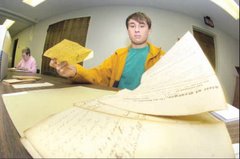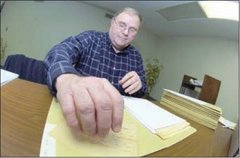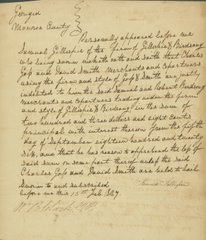- Superior Court (which is huge and will probably need to be split further for ease of use)
- Inferior Court
- Ordinary Court
- Justice of Peace Court
- County Court
recordgroup#series#yearmonthfolder
So for Box 2, Folder 9/1830:6 from the Superior Court Record Group (i.e., record group 1) and Court Sessions series (i.e., series 5), my dao link (also to be my unique identifier for the DC records to be made later) would be
rg1se518300906
One of the issues that I did discover when linking was the issue of multiple folders representing a file unit. I'll need to add additional dao links within daogrp and tweak the stylesheet (a basic one DLG has employed for our other EAD projects, such as the Auburn Avenue Research Library's finding aids: http://dlg.galileo.usg.edu/aafa/) a little to make them display in a way that makes more sense. (Currently the stylesheet calls each daoloc in a group a page.) I'm also thinking of a way to automate adding the multiple daos and how best to split up the behemoth that is the Supreme Court Sessions finding aid. I did pull out some of the extras from the finding aid (the glossary and list of Troup County officials) into separate html files.
My plan is to use a link checker each time we post new files to catch link issues. Once the finding aid is in a mostly finalized form (i.e., all linking is perfect), I'll run it through the date normalizer perl script written by Jason Casden at the Ohio State University, Jerome Lawrence and Robert E. Lee Theatre Research Institute that is available through the tools page on the ead help pages (http://www.archivists.org/saagroups/ead/tools.html) and the RLG report card.





3 comments:
troupscanning.blogspot.com is very informative. The article is very professionally written. I enjoy reading troupscanning.blogspot.com every day.
pay day loans
payday loan
Thanks for article. Everytime like to read you.
This is great!
Post a Comment